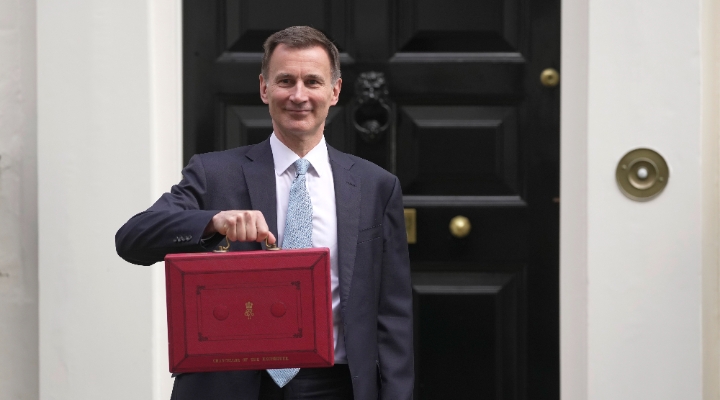
Inflation is now expected to drop below the Bank of England's 2% target in the coming months, the chancellor said today in his Budget speech.
Published by the Office for Budget Responsibility, this forecast is at odds with the Bank's own February forecasts, which said inflation would rise towards the end of 2024, before hitting target in 2025.
Politically, it could also be seen to put pressure on the Bank and its Monetary Policy Committee to cut interest rates sooner. Its next meeting is this month.
The inflation forecast was introduced early on in Jeremy Hunt's speech, but he revisited Britain's economic prospects in a later part of statement too. Inflation is expected to fall and growth is expected to higher than forecast at the autumn statement in November 2023.
UK in Recession Last Year
While official data shows the UK fell into a technical recession – two successive quarters of negative economic growth – at the end of the 2023, the OBR is forecasting growth of 0.8% for 2024 as a whole. This full-year forecast may obscure the short-term weakness at the start of the year.
But GDP is forecast to then rise in 2025 to 1.9%, significantly higher than expected in November, followed by an increase of 2.2% in 2026. 2024, 2025 and 2026 GDP forecasts were 0.7%, 1.9% and 2% in the autumn statement. But 2027 and 2028 GDP forecasts are lower than those made four months ago.
It's worth saying these forecasts are subject to change. A year ago the chancellor said the UK would swerve a technical recession in 2024, an assessment that was backed by OBR forecasts. In the Autumn Statement in November, Hunt then relayed the OBR's forecast that inflation would not, in fact, hit the 2% target until 2025.
Upcoming UK Economic Data:
• Unemployment rate and change (January), March 12;
• UK GDP year on year (January), March 13;
• Inflation (February), March 20;
• Bank of England meeting, March 21.
British Workers are Missing
As the UK approaches the end of its first business quarter, the overall economic picture is mixed; our dominant service sector is still expanding, according to the latest PMI data; unemployment is at multi-decade lows; and wage growth is still buoyant.
But a large chunk of the older workforce is missing or ill following Covid-19. This is troublesome for policymakers tasked with funding the State Pension and its triple-locked commitment to raising payments by the higher of inflation, wages, or 2.5%.
In terms of GDP growth, the UK economy is in worse health than before the financial crisis of 2008 and before the pandemic, which itself triggered a wave of public spending. Low interest rates for a large part of that period have cushioned the blow for many workers and consumers, allowing cheap credit and mortgages. But external factors have also made a big impact, including the Ukraine-Russia war, Brexit and the global pandemic.
The Bank of England next meets to decide interest rates on March 21.





























